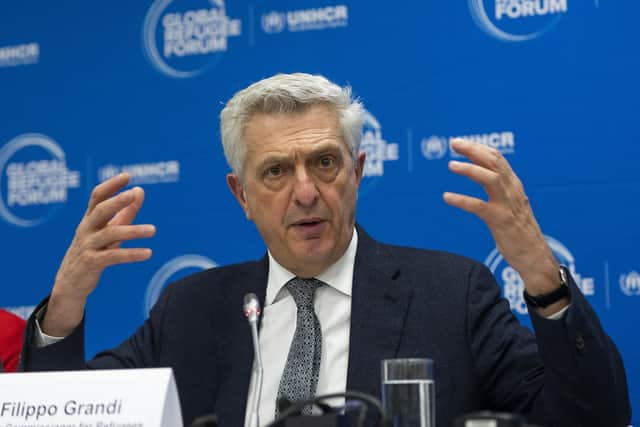UK credibility 'pretty low' as government pushes ahead with Rwanda bill on opening day of Global Refugee Forum
As prime minister Rishi Sunak breathed a sigh of relief after his controversial bill to send asylum seekers to Rwanda was passed on Wednesday morning, hundreds of delegates were gathering in Switzerland to discuss the world’s most pressing refugee issues.
Held every four years, the Global Refugee Forum is the world’s largest international gathering on the topic, bringing together decision-makers and stakeholders from around the globe – including refugees themselves – to find solutions and pledge action for both individuals forced to flee their homes and the countries and communities hosting them.
Advertisement
Hide AdAdvertisement
Hide AdAddressing delegates at the opening of the forum, Filippo Grandi, high commissioner of the United Nations’ refugee arm, UNHCR, warned that the current refugee crisis around the world “is as big and as urgent as it gets”.


“It is easy to sometimes forget that forced displacement also remains an unresolved problem that concerns us all, and not only when we see images of massive flows or when refugees knock at our doors,” he said. “And which – like other global challenges – is made more difficult by an increasingly divided international community.”
Mr Grandi pointed out that 114 million people worldwide are currently displaced from their homes as a result of persecution, human rights violations, violence, armed conflict or serious public disorder.
Yet, as the crisis deepens, the international response is becoming less. An increasing number of countries are struggling to afford to host the number of people who have taken refuge within their borders as international aid budgets of richer, Western or “global north” nations, is cut.
Around three quarters of the world’s refugees are hosted by low and middle income countries, often already pushed to their own financial limits to provide for their own citizens.


Just days earlier, Martin Griffiths, the UN’s emergency relief coordinator, admitted that he had been forced to cut back his request for international aid this year, not because the need was any less – in fact, quite the opposite – but because the agency had received just a third of the amount it had asked for over the past twelve months.
“If we cannot provide more help in 2024, people will pay for it with their lives,” he warned.
More than 300 refugees are among the 4,200 people attending the Forum this week, almost 10 per cent of the total delegates.
Advertisement
Hide AdAdvertisement
Hide Ad“I feel like in the UK, we’ve barely had a chance to even think about the Forum, given what our government is currently trying to do,” says Dr Dan Fisher, researcher at the University of Glasgow’s Centre for Public Policy.
He points to a speech given on Wednesday at the Forum by King Abdullah II of Jordan, which is currently host to around 4 million refugees, including 1.5m Syrians, many of whom have been there for many years. The refugee community makes up a third of Jordan’s 11m-strong population.
“They said that they’ve received only about 22 per cent of the funding they need to cover the assistance they’re giving,” says Dr Fisher. “The brutal reality of all this is we're spending something like £400 million in order to try to combat what the UK Government calls the ‘pull factors’.
“Anyone who works in this area knows it’s more about the push factors than the pull factors.”
As well as the “push factors” of war, famine persecution or natural disaster, Dr Fisher points out that many people are forced to move further afield due to pressures on governments of nations bordering their home country – often countries with lower incomes.
“One of the other reasons people leave is that the countries in the immediate vicinity of the one they’ve fled are just not able to cope with the sheer number of refugees that there are,” he says.
“My sense is that the forum is attempting to bring attention back to the current global humanitarian needs that we’'re experiencing at the minute. Judging by the statements, it’s attempting to say, ‘Look, this is a global issue that we need to not forget’, because there's so many other issues happening.
“It’s also the case that the nations in the global north see [the refugee crisis] as a domestic issue of security, as opposed to a global humanitarian issue. So I think the point of the forum is to try to rally behind this. I think they are trying to learn from [climate change forum] COP in the sense that this is a global problem, and it can only be solved with global solutions.”
Advertisement
Hide AdAdvertisement
Hide AdIn November 2020, the UK Government announced international aid spending would fall from 0.7 per cent to 0.5 per cent of Gross National Income (GNI) as a “temporary measure,” in response to the Covid-19 pandemic's effects on the UK's public finances and economy. It is not planned to return to 0.7 per cent until at least after the fiscal year of 2027/2028.
“I think our credibility on the on the international stage, both inside Europe and outside Europe is pretty low,” says Dr Fisher. “Everyone's aware that we’re trying to effectively block our responsibilities.
“It is disheartening, but not at all surprising, to see the UK Government attempt to pass another heavy-fisted piece of legislation to fix what is a political issue of their own making, and what is now also a bureaucratic mess and a humanitarian crisis.”
Just hours after Mr Sunak’s bill was given parliamentary approval, the House of Lords said it would launch an inquiry into the proposals.
Last month, the Supreme Court ruled the UK Government’s Rwanda policy is unlawful and would have endangered those being sent to the country. The ruling came after the Home Office challenged a Court of Appeal decision from June that overturned the High Court’s finding that Rwanda could be considered a “safe third country” for migrants.
However, Mr Sunak pushed through the bill after agreeing a new treaty with Rwanda, that Downing Street claiming showed the country has made changes to address the concerns.
Despite fears of a Tory rebellion, the bill passed in the House of Commons this week by a majority of 44, however around 29 Conservative MPs – including former immigration minister Robert Jenrick, who resigned over the legislation last week, abstained.
The Lords said it wanted to scrutinise whether the changes to the asylum partnership made by the new agreement are “likely to meet the concerns raised by the Supreme Court” – and said it wanted to “hold the government accountable”.
Advertisement
Hide AdAdvertisement
Hide AdAnnouncing the inquiry – which is to take place within a tight timescale, requiring all evidence to be submitted by 29 December – Lord Goldsmith, chair of the international agreements committee, said it was “paramount” to scrutinise whether the agreement with Rwanda addresses the concerns raised by the Supreme Court about the Government’s Rwanda policy.
He said: “With the Supreme Court having previously decided that the Home Office’s Rwanda policy was unlawful because, there were substantial grounds for believing that there was a real risk of people being returned to countries where they would be at risk (‘refoulement’) due to deficiencies in Rwanda’s asylum system, we, as a committee, will do all we can to present a clear picture to the Government and Parliament on whether the Agreement deals with those concerns.”
Refugee rights organisations have condemned the bill. UNHCR has said it has “deep concern” about the “externalisation” of countries’ asylum obligations and the serious risks it believes the scheme poses for refugees.
Professor Alison Phipps, UNESCO chair in refugee integration through languages and the arts at the University of Glasgow, said: “Reading between the lines, UNHCR is obviously furious at this. They put in a very strong case to the Supreme Court to argue that Rwanda was not a safe country; to point out that the scheme that Israel ran to deport people to Rwanda failed catastrophically; to point out that there are refugee populations in Rwanda who have been at severe risk of human rights abuses.
“And to point out even more, that not only is this in breach of the clauses within the Refugee Convention, but also that it undermines the world order and the Refugee Convention worldwide and that they within the international community are very conscious that the UK does not further erodes confidence in the Refugee Convention.”
She points to countries such as Austria, which last month signed a “migration and security agreement” with then-UK home secretary Suella Braverman, in which the two countries agreed to work more closely together to create a similar system for Austria to send asylum seekers to a third party country.
“[They’re thinking], ‘If the UK can get away with that, then we will, too’,” she says. “These are not majority hosting countries, these are countries that have taken very, very few refugees and which have a very high GDP. The UK has a lower population density by quite a long way to that of Rwanda.
“The Supreme Court was very clear. This also wastes an awful lot of the time and energy of campaign groups and academic groups of researchers of lawyers. All now really trying to uphold the rule of law, to maintain the sovereignty of the rule of law, and to maintain international law, including features that we signed – and including the European Court of Human Rights and the Convention on Human Rights that we, as a country, were the first to sign.”
Advertisement
Hide AdAdvertisement
Hide AdShe adds: “My view on this is that an awful lot more of taxpayers money is going to be wasted in the courts, ultimately.
“It is nothing to do with competently managing migration, and it has everything to do with a belief that if you are really horrible to people you don’t like, they’ll go away.”
Comments
Want to join the conversation? Please or to comment on this article.
